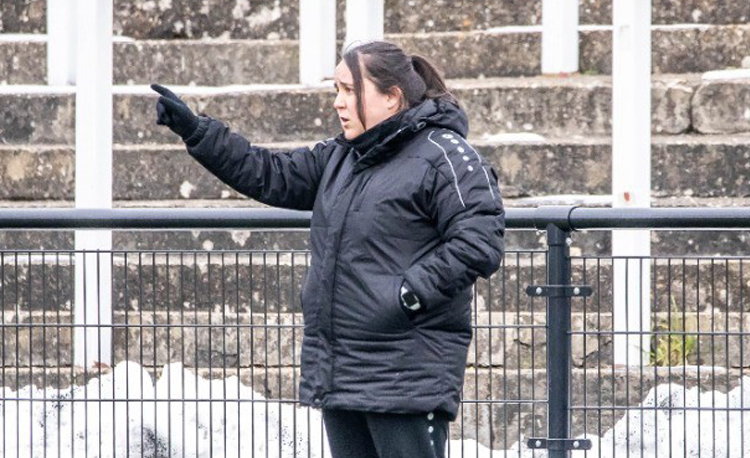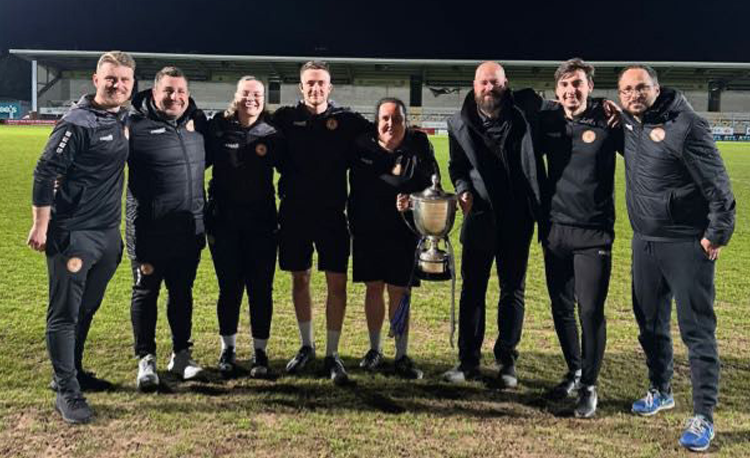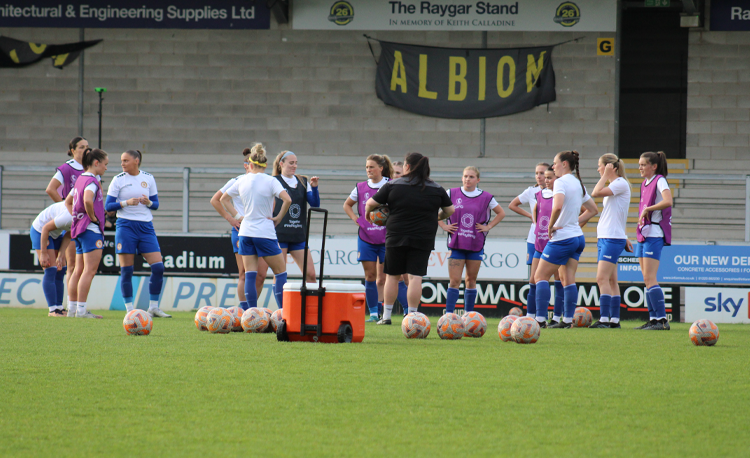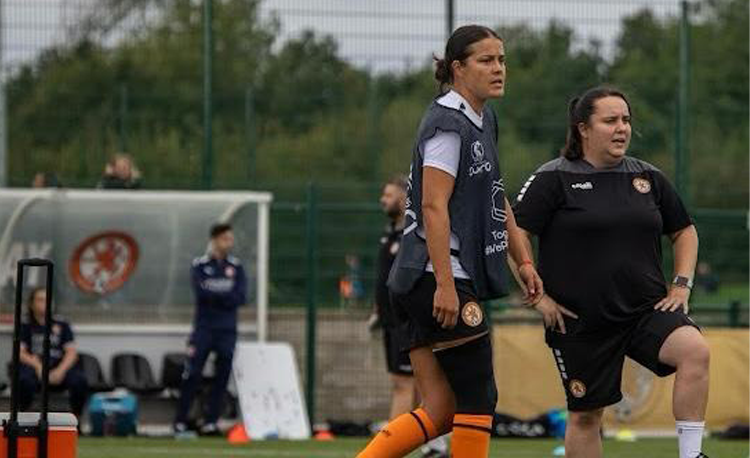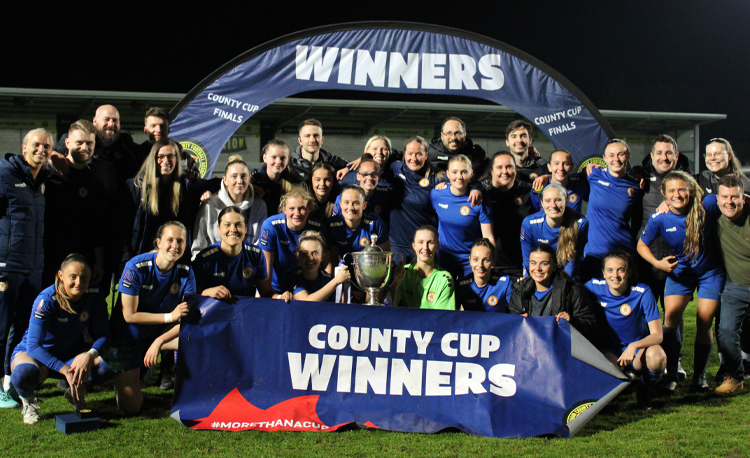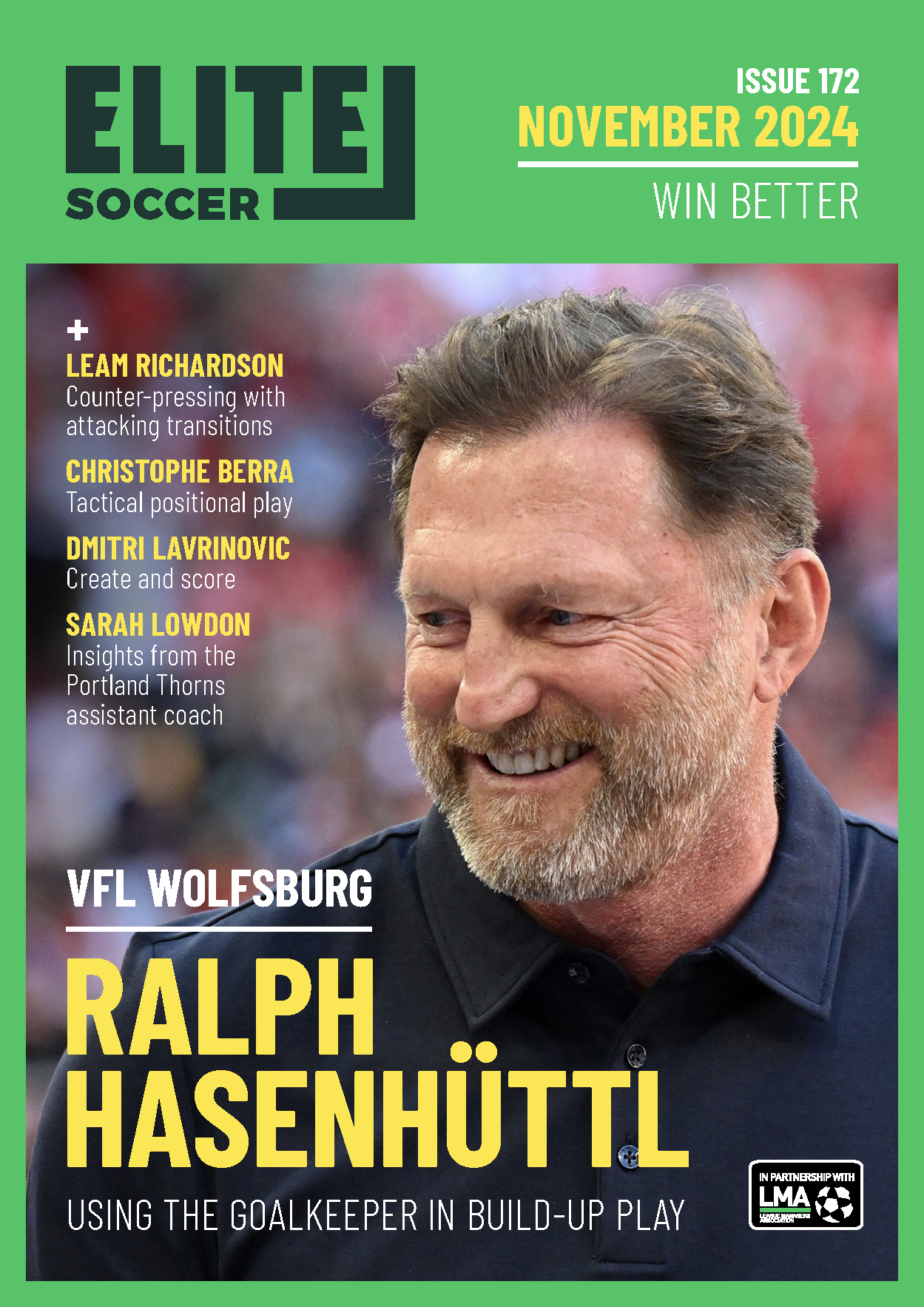You are viewing 1 of your 1 free articles
Sian Osmond: The coaching craft
Rugby Borough Women’s Sian Osmond talks to Carrie Dunn about working across the men’s and women’s game as well as across age groups, and what it means to be an assistant coach
Osmond on her start in coaching
I played in goal, and around the age of 14, I started doing some additional goalkeeping coaching for a grassroots side that my little brother played for. I was helping out the under 7s, under 8s, under 9s. My passion for it sparked, and it reinforced the learning that I was doing with my own goalkeeping coach. When I turned 16, I was lucky enough to be able to go on my Level One coaching course, which was supported by my college at the time. That was an all-female course and a lot of my peers were on it. Off the back of that, I got my first paid coaching role at Brentford Community Trust, working in Saturday soccer schools.
I still wanted to be a footballer. That was my dream. The coaching was something that I wanted to do alongside it because it benefited my own game – I could give people information on the pitch that was more useful. From there I took my Level Two coaching badge, then the goalkeeping badges. I volunteered then at the age of 18 at a men’s non-league side, which was an interesting experience and gave me some confidence moving forward.
Once I started getting more involved with games, I really felt the excitement on the touchline, and that replicated how I felt when I was playing. That was what made me want to continue my coaching journey. At university, I studied sports rehabilitation at St Mary’s, and although I was still playing, I ruptured my ACL going into my third year, so being able to coach was my connection to the game.
Osmond on her professional journey
Football was always going to be my career path. I got a job at Barnet, working for the boys’ academy, and I started to get involved with the women’s side there, London Bees. I got a bursary for my UEFA B Licence, and year on year, I shifted roles and got closer to coaching with the first team. I started off with the development team, becoming their manager, then I was assisting with the first team, and eventually ended up as first-team manager.
During this time, I met Lee Burch, who’s the manager I currently work under at Rugby Borough. He really nurtured me and got me through the UEFA A Licence process. He moved on from London Bees and I had a year and a bit leading the side, and then he got a new opportunity at Coventry United, which is when I decided to leave. It was a move that I thought was the right thing for me, to go back into the Women’s Championship. Coventry United were later relegated into the National League South, and now as Rugby Borough we are in the National League North for this coming season.
Osmond on shifting from manager to assistant
The large deciding factor was my experience working with Lee. He was a mentor for me at London Bees, and gave me the opportunity on the grass to coach and give me ownership on sessions that really started to help me grow and develop my own craft.
I was really grateful for that, and having the opportunity to work with him again was a bit of a no-brainer. I’d had a bit of experience as manager, which I did enjoy, and I think it’s something that I’d like to do further down the line. But I still feel like I’ve got more learning to do, so being supported and owning parts of what we do day to day is helping me.
Related Files
Osmond on being an assistant
Football is a game of opinions. We don’t have the exact same mindset on everything. It’s just developing that relationship so that you can have that healthy conversation about decisions that need to be made. Over the course of the years that we’ve worked together, I think we do that well. It’s helped that we’ve set the parameters in terms of what our expectations of each other are every season. We’ve always sat down, had those conversations: “This is what I want you to focus on and potentially challenge.”
Osmond on the differences across the game
The football is the same. The Xs and the Os and the tactics and everything else will remain relatively consistent. It’s the players’ needs that slightly shift and adjust, what they need from you. But that’s not a difference between, say, the men’s and women’s game: it’s from player to player. What every player needs from you as an individual will vary quite drastically at times within your squad. Understanding what each of them really needs from you and how they need your information to come across is the art of coaching. That’s how you actually impact the individual. In the women’s game, perhaps a few more questions are asked; it’s brilliant, it’s a way of checking, challenging, and understanding. The biggest difference is now I’m working with professional athletes, so they need different information, game by game, and session by session.
Osmond on the learning process
I don’t think that the learning ever stops, because the game will constantly evolve and change. It tends to go in cycles, I feel, in terms of what’s fashionable, in terms of formation and styles of play. There’s always someone trying to counteract what you’re doing on a matchday, so you’re constantly learning to perfect your game plan as well. It sometimes feels like a bit of a game of chess that you’re always in with your opponent, but while you’re playing that, you’re learning so much about what you’re teaching your players as well. The game is always changing and progressing and growing. Particularly as the women’s game professionalises, I think there’s more to make sure that we’re supporting the athletes in the best possible way we can. From that perspective, I still think there’s loads to learn.
Osmond on what she loves about coaching
Some of the best moments that I’ve experienced is being able to support players, whether it’s coming back from injury or just developing players, from development centre into the first team, from first team into international football, that’s probably the most rewarding stuff. Obviously, winning is also really great! But the biggest thing for me is just working with people on a day-to-day basis, and watching them grow.

Carrie Dunn
Editor's Picks
Using the goalkeeper in build-up play
Pressing principles
Intensive boxes drill with goals
Penetrating the final third
Creating and finishing
My philosophy
Pressing initiation
Compact team movement
Defensive organisation
Coaches' Testimonials

Alan Pardew

Arsène Wenger

Brendan Rodgers

Carlos Carvalhal

José Mourinho

Jürgen Klopp

Pep Guardiola

Roy Hodgson

Sir Alex Ferguson

Steven Gerrard
Coaches' Testimonials

Gerald Kearney, Downtown Las Vegas Soccer Club

Paul Butler, Florida, USA

Rick Shields, Springboro, USA

Tony Green, Pierrefonds Titans, Quebec, Canada
Join the world's leading coaches and managers and discover for yourself one of the best kept secrets in coaching. No other training tool on the planet is written or read by the calibre of names you’ll find in Elite Soccer.
In a recent survey 92% of subscribers said Elite Soccer makes them more confident, 89% said it makes them a more effective coach and 91% said it makes them more inspired.
Get Monthly Inspiration
All the latest techniques and approaches
Since 2010 Elite Soccer has given subscribers exclusive insight into the training ground practices of the world’s best coaches. Published in partnership with the League Managers Association we have unparalleled access to the leading lights in the English leagues, as well as a host of international managers.
Elite Soccer exclusively features sessions written by the coaches themselves. There are no observed sessions and no sessions “in the style of”, just first-hand advice delivered direct to you from the coach.
